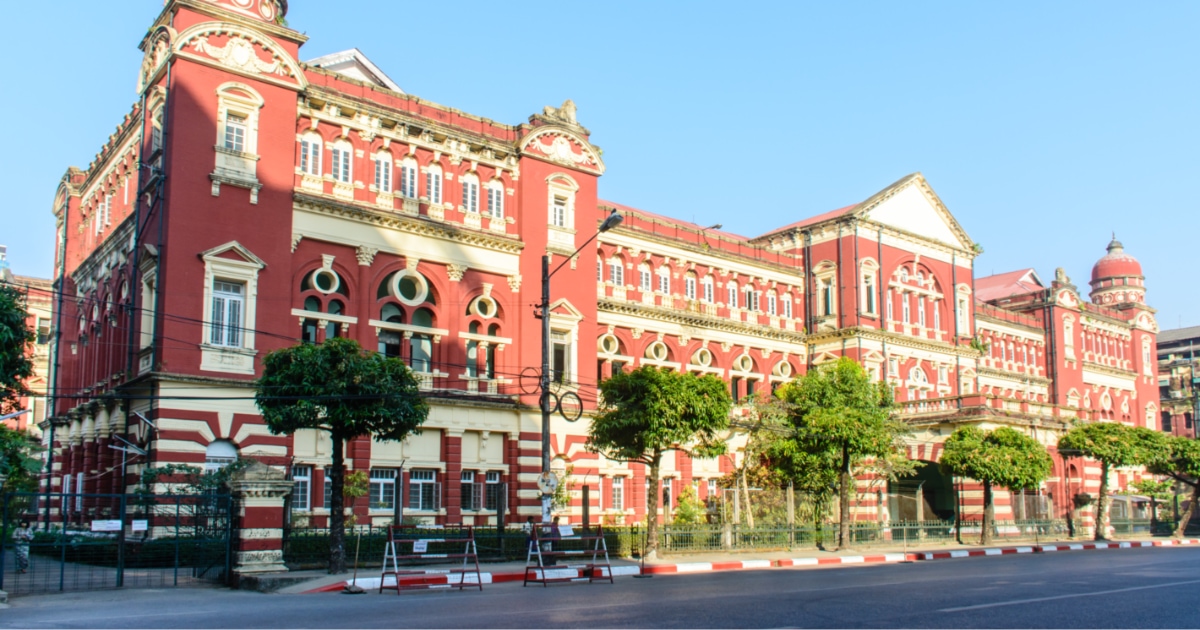
Download PDF | Download word version
Introduction
The State Administration Council issued the new Organisation Registration Law (the 2022 Law), which repeals the 2014 Organisation Registration Law (the 2014 Law), on 28 October 2022. The 2022 Law introduces a new regime applicable to the establishment of both local non-governmental organisations (NGOs) and international non-governmental organisations (INGOs).
According to the 2022 Law, “local organisation” means a non-governmental organisation formed with five or more citizens registered under it with a view to carry out activities, without the purpose of making profits, in accordance with the rights contained in the Constitution of the Republic of the Union of Myanmar, for the benefits of the State and its citizens. This includes its branch offices opened in the country with the approval of the Union Registration Board (the Board).[1]
Additionally, “international non-governmental organisation” is defined as “an organisation formed in any foreign country which was registered under the 2022 Law at the Board to open its branch office in the country with at least 40 percent of Myanmar citizens in the executive committee in order to conduct any activity within the country without the purpose of making profits”. This includes its branch offices opened in the country with the approval of the Board.[2]
The new law aims to implement a system in respect of the registration of NGOs and INGOs whereby the government recognises their activities as being for the benefit of the State and its citizens, and contribute to establish a ‘strong civil society’. In addition, it is intended to protect the status of organisations as a result of the registration in accordance with the law, as well as to obtain necessary lawful assistance for any activities of organisations by regulating the relationship between NGOs, INGOs and responsible government ministries.
Registration of NGOs and INGOs
Subject to the provisions of the 2022 Law, NGOs and INGOs which obtained a registration certificate under the 2014 Law may continue their activities until the expiration of the registration certificate. After the expiry of the registration certificate, such NGOs and INGOs must apply for a new registration certificate under the 2022 Law if they wish to continue their activities.[3]
For all organisations formed without registration before the enactment of the 2022 Law, they must apply for a registration certificate within 60 days after the enactment of the 2022 Law (i.e. 28 October 2022) if they wish to continue their activities.[4]
Registration Requirements of NGOs and INGOs
In order to apply for an NGO registration certificate, the chairman, secretary, executive member or a member assigned the duty, with the power of attorney to apply for registration, must submit the following information and/or documents to the relevant registration board[5]:
- name of the organisation;
- name of its chairman and secretary;
- location and contact address of the organisation;
- organisation’s establishment date;
- description of the organisation’s objectives and intended activities;
- recommendation from government departments and agencies in charge of the objectives and programmes;
- number of executive committee members;
- number of staff;
- a schedule of the organisation’s cash and assets;
- a list of activities to be carried out;
- articles of association;
- application date; and
- an undertaking to comply with the provisions of all existing laws.
On the other hand, an INGO must submit the following to the Board to apply for a registration certificate[6]:
- name of the organisation;
- summary description of the organisation’s background;
- name of the organisation’s head in the country of origin;
- name of the person in charge of the organisation’s activities in Myanmar;
- location and address of the organisation in the country of origin;
- evidence of registration or incorporation of the organisation in the country of origin;
- constitutional documents of the organisation in the country of origin;
- memorandum of understanding (draft);
- name of the person in charge of the organisation in Myanmar;
- composition of the Myanmar executive committee:
- number of Myanmar citizens; and
- number of foreigners;
- total number of staff ;
- description of the activities to be carried out within Myanmar and the source of funding;
- recommendation from government departments and agencies in charge of the objectives and programmes;
- recommendations from the Ministry of Investment and Foreign Economic Relations and the Ministry of Immigration and Population;
- letter requesting the opinion remarks of the Ministry of Foreign Affairs;
- permission from the local administration body where the INGO intends to carry out its activities;
- contact details of the organisation’s branch office(s) in Myanmar (if any);
- names of the persons in charge of the branch office(s) in Myanmar (if any);
- number of branch offices in Myanmar and their contact addresses (if any); and
- an undertaking to comply with the provisions of all existing laws.
The Registration Certificate
A registration certificate means the certificate issued by the relevant registration board for the organisation. A temporary registration certificate will be issued by the relevant registration board within 21 days from the date of application. Once the application is approved by the relevant registration board, the registration certificate will be issued within 30 days from the date of approval. The organisation must return the temporary certificate to the relevant registration board upon receiving the registration certificate.
Where the relevant registration board rejects an organisation’s application it may amend its initial application and resubmit it within 30 days from the date of the rejection. The decision subsequent to resubmission is final.
The term of the registration certificate is 5 years from the date of approval by the relevant registration body. Where the organisation wishes to continue its activities after the expiry of its registration certificate it must submit an application for the renewal at least 90 days before its expiry.
Organisations excluded from Registration
The following organisations and associations are exempt from registration under the 2022 Law[7]:
- organisations engaged directly or indirectly in matters of religion, religious affairs, economics and politics in accordance with any existing law;
- political parties that are required to apply to the Union Election Commission under the Political Parties Registration Law (2010);
- organisations formed under any existing law other than the 2022 Law; and
- organisations formed by the union, regional or union territory level government organisations.
Rights and Obligations of NGOs and INGOs
Under Chapter 7 of the 2022 Law, NGOs and INGOs registered thereunder have the right to:
- request governmental assistance to further the organisation’s activities in accordance with the law;
- receive grants, funds and donations from local and international organisations;
- open bank accounts;
- possess movable and immovable property in accordance with existing laws,
- sue and be sued;
- own intellectual property rights (name, trademark and design) of the organisation whilst holding a valid registration certificate;
- defend and stand trial in accordance with the law; and
- provide emergency assistance, upon the declaration of a natural disaster under the Natural Disaster Management Law (2013), without approval from the relevant registration body. (However, it still requires approval from the local administration)
Under the 2022 Law, NGOs and INGOs must file an annual report to the relevant registration board within 60 days from the end of each calendar year and submit quarterly reports of its activities to the relevant Township General Administration Department. They must also obtain approval from a majority vote of registered executive committee members and the relevant registration board for the organisation’s name and address change, relocation, opening of branch offices and closure or dissolution.
Administrative Actions and Prohibitions
Subject to the 2022 Law, registered NGOs and INGOs must allow for ‘inspections’, examinations and audits of documents, and respond to enquiries by the authorities. They will also be subject to authorities’ audits of its funds and assets (inclusive of, where necessary, its annual financial statements). If a registered NGO and INGO fails to comply with the aforementioned obligations, the relevant registration board may take administrative actions (including warnings, restricting the activities of the organisation for a specified period, temporarily suspending the registration certificate for a specified period, and/or revoking the registration certificate).
There are various prohibitions for registered NGOs and INGOs in Chapter 9 of the 2022 Law. No association:
- is permitted to operate in Myanmar without a valid registration or operate one after the expiry or revocation of its registration certificate; and
- shall, while holding a valid registration certificate:
- secure, transfer, use or provide any funds, assets or assistance through illegal means and ‘conceal or withhold any such acts’; and
- directly or indirectly communicate or abet:
- any armed organisations and individuals fighting against the State;
- any organisation identified by the State as having committed acts of terrorism; or
- any unlawful associations and their members.
Any organisation found to be in contravention of Chapter 9 prohibitions shall be subjected to monetary fines and/or imprisonment.
[1] Section 2 (c) of the 2022 Law
[2] Section 2 (d) of the 2022 Law
[3] Section 56 of the 2022 Law
[4] Section 55 of the 2022 Law
[5] Section 7 of the 2022 Law
[6] Section 17 of the 2022 Law
[7] Section 26 of the 2022 Law
State Administration Council
Myanmar Organisation Registration Law
Union Registration Board
Section 2 of the Myanmar Organisation Registration Law
Section 55 of the Myanmar Organisation Registration Law
Section 7 of the Myanmar Organisation Registration Law
Section 56 of the Myanmar Organisation Registration Law
Chapter 7 of the Myanmar Organisation Registration Law
Chapter 9 of the Myanmar Organisation Registration Law
Myanmar INGO registration certificate
Myanmar NGO registration certificate
Myanmar Political Parties Registration Law
Township General Administration Department
Union Election Commission
Myanmar Natural Disaster Management Law
Constitution of the Republic of the Union of Myanmar
This newsletter is for information purposes only. Its contents do not constitute legal advice and it should not be regarded as a substitute for detailed advice in individual cases.
Transmission of this information is not intended to create and receipt does not constitute a lawyer-client relationship between Charltons and the user or browser.
Charltons is not responsible for any third party content which can be accessed through the website.
If you do not wish to receive this newsletter please let us know by emailing us at unsubscribe@charltonslaw.com






